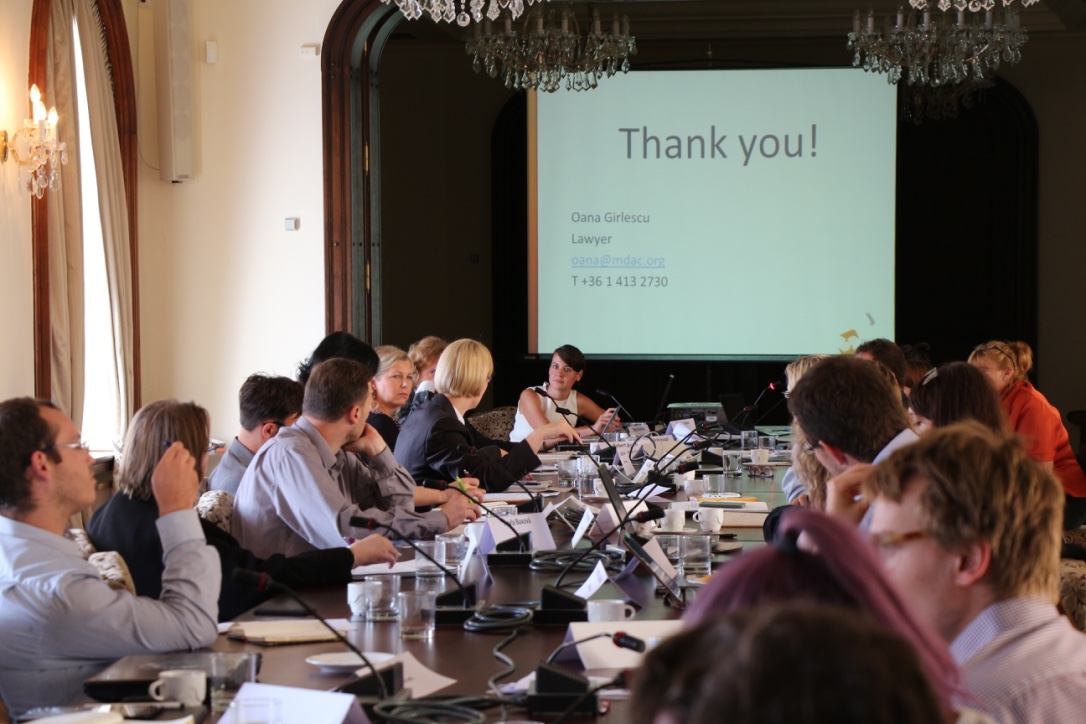All children have the right to inclusive education
Despite significant pressure from civil society and the international community, the Czech Republic still denies inclusive education to tens of thousands of children with disabilities and from the Roma community. Few steps have been taken and there continues to be a lack of understanding about how to achieve full inclusion for all.
 Conference in Prague ©LIGA
Conference in Prague ©LIGA
Inclusive education was the topic of a roundtable which was organised on the 3rd September 2015, in Prague, by the League of Human Rights, Open Society Fund Prague and Mental Disability Advocacy Centre (MDAC). The purpose of the round table was to agree practical next steps for reform of the education system, and was also attended by a number of international guests, non-governmental organisations and academics. The Government was represented by its Committee for Citizens with Disabilities and representatives of the Ministry of Education.
“Inclusive education is the only type of education which ensures quality by recognising and developing the potential of every individual child. As a human rights standard, it requires that no child is rejected from their school on the basis of disability and at the same time, that every school is capable of providing reasonable accommodation with regards to the needs of every child”, Facundo Chávez, human rights and disability adviser to the UN Office of the High Commissioner on Human Rights pointed out. “Reasonable accommodation” refers to the obligation of schools to ensure that children get the individual support they need to achieve to their highest potential.
Inclusive education is also the only adequate approach towards eliminating discrimination against Roma children and children with disabilities. Adam Weiss, Legal Director of European Roma Rights Center (ERRC) said that “organisations fighting for the rights of Roma children and those fighting for rights of children with disabilities should work together on the basis of article 24 of the Convention on the Rights of Persons with Disabilities toward a strategy advocating for inclusive education.”
Article 24 of the Convention on the Rights of Persons with Disabilities sets out the right for all children, regardless of their impairments, to be included in the general education system. The right recognises that the development of children is the greatest when they are able to interact with their non-disabled peers on an equal basis.
Oana Girlescu from MDAC said that inclusive education can and should be ensured for all children. “The right to inclusive education does not provide for any exemptions and has to be ensured for all, including children with severe and combined disabilities. While this right has to be balanced with the right to choose in education, this cannot be interpreted as allowing for segregation or ‘special schooling’. At the same time, according to the Convention, it is not acceptable to refuse to provide individualised support to a child on the basis of resource constraints; the school and the state alike must do everything necessary to allocate adequate budgets to achieve inclusion.” These are the basic principles the Czech Government must keep in mind, particularly when reforming budgetary allocations
“For quality inclusive education, it is also necessary to introduce a system of data collection, which will show us the impact of education on different groups of students with disabilities or minorities in our school system”, Štěpán Drahokoupil from OSF Prague mentioned.
Czech education legislation is undergoing reform, under the scrutiny of the European Union and others. Participants at the roundtable agreed that the principle of inclusion must guide ongoing reforms including in the text of the Education Act. Participants also discussed the position of some teachers who oppose inclusion and the importance of collecting data on educational outcomes. Another key issue of concern is the fact that parents and children currently lack effective ways of challenging educational segregation.
The current situation means that the Czech Republic is in breach of its obligations under international law. Five years ago the Government agreed to create an inclusive system of education by ratifying the Convention on the Rights of Persons with Disabilities (CRPD). Eight years ago the state was also ordered to tackle high rates of Roma segregation by the European Court of Human Rights in the famous D.H. and others v. the Czech Republic case.
With our partners in the Czech Republic, MDAC calls on the Czech Government to open up full dialogue with civil society to urgently adopt a plan of action which ensure that no child is left behind.

